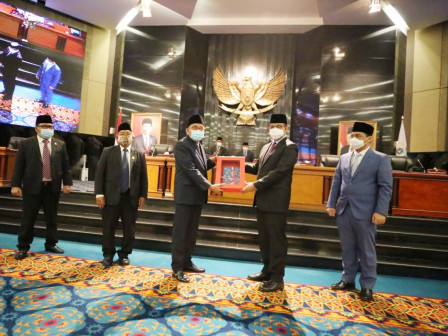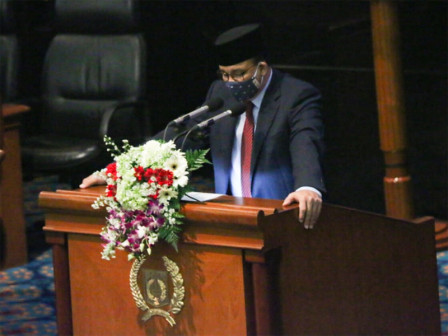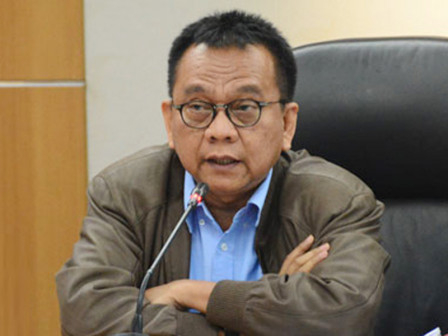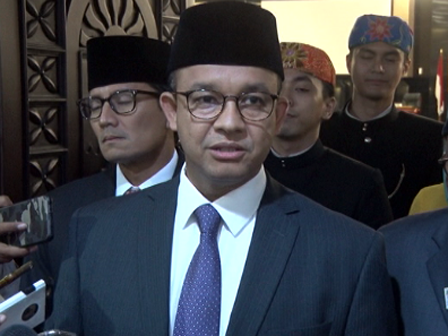Anies Lays Out City's LKPJ Development Achievements Amid COVID-19 Outbreak
Reported by Yudha Peta Ogara | Translated by Nugroho Adibrata
Jakarta Governor Anies Baswedan, submitted a governor accountability report (LKPJ) in the plenary meeting held at the Jakarta DPRD Building, on Monday (4/19).
Alhamdulillah, this result is very good
On that occasion, he explained the implementation of regional government for one year, where last year Jakarta Provincial Government struggled to fight the COVID-19 outbreak and overcome the various impacts caused by the health crisis.
Nevertheless, several macro indicators presented had increased, including the Human Development Index (HDI) where the human development performance in Jakarta last year was recorded at 80.77, which was higher than the previous year at 80.76. Amid the pandemic, Jakarta's HDI was the highest in Indonesia and the only province with an HDI score above 80 or "very high". The health dimension was evident in life expectancy Jakarta reached 72.91 years, had increased from 2019 was 72.79 years. The dimension of knowledge, namely the Expectation for the length and Average Length of Schooling, also increased. Expectations for the length of schooling reached 12.98 years, increased from 12.97 years in 2019, while the average length of schooling reached 11.13 years, had increased from 2019, which was 11.06 years.
DPRD will Evaluate LKPJ on City Budget 2019"Alhamdulillah, this result is very good, despite we are dealing with the pandemic situation, which creates an economic dimension, namely Adjusted Per Capita Expenditure for Jakarta residents reaching Rp 18.23 million per year, decreased by 1.62 percent compared to 2019 amounting to Rp 18.53 million. This situation has had such a big impact on the economy and even social activities, has weakened people's purchasing power thus public consumption expenditure has decreased," he explained, as quoted by Jakarta PPID's press release.
In Economic Indicators, last year Jakarta showed an improved performance. That meant the city's economic growth had contracted by minus 2.36 percent. The pandemic situation also caused domestic aggregate demand to contract. In terms of expenditure, the economy contracted in all components, except for Government Consumption Expenditure (PKP) which grew by 1.60 percent. Household consumption, which is the motor of growth in terms of expenditure, had contracted due to reduced purchasing power, including other components, such as Gross Fixed Capital Formation (PMTB), Exports and Imports. This situation also changed the last year's inflation pattern.
"Restrictions on community activities to deal with the virus greatly affect the demand or purchasing power of the community. The declining economic activity is seen from the fairly low inflation rate, where inflation in Jakarta during January - December 2020 was 1.59 percent, lower than the inflation rate for the same period in 2019, which was at 3.23 percent," he he added
As for Social Indicators, based on the number of poor people last September, it was recorded at 496.84 thousand people or 4.69 percent. The number increased when compared to the number of poor people in September 2019 by 362.30 thousand people or 3.42 percent. The COVID-19 pandemic was a contributing factor to the increase in the number of poor people in Jakarta. However, its number was lowest compared to other provinces in Indonesia, and much lower than the percentage of the total number of poor people nationally of 27.55 million people or 10.19 percent.
He also explained the development results related to the Regional Development Program according to the medium-term mission in the 2017-2022 RPJMD, in which he outlined the results per mission. In the Regional Development Program in the first mission, namely Jakarta, a city that is safe, healthy, smart, cultured, by strengthening family values and providing space for creativity through leadership that engages, mobilizes and humanizes, the city had distributed State PAUD Education Operational Costs, Operational Assistance Schools (BOS) and Educational Operational Costs for Special School Education (BOP-SLBN) for SD, SMP, SMA, SMK and SLB for the 9 year compulsory education program; undertake the Regional Health Insurance for 4,500,000 Contribution Beneficiary Participants; provided incentives for Health Workers handling COVID-19 and management of disease investigations with potential for extraordinary events (KLB); and so forth.
"While for the Regional Development Program in the second mission, namely Jakarta, a city that advances general welfare through the creation of jobs, stability and affordability of basic needs, increased social justice, accelerated infrastructure development, ease of investment and business, and improved spatial management, the city has run the Entrepreneurship Development and SME Development Program, the Public Transportation Development and Implementation Program, the Flood and Abrasion Control Program, the Clean Water and Wastewater Management Development and Management Program, the Solid Waste Management Program, the Road and Bridge Construction/Improvement Program, and the Provision and Maintenance of Public Transportation Development and Implementation Program, the Flood and Abrasion Control Program, the Clean Water and Wastewater Management Development and Management Program, the Solid Waste Management Program, the Road and Bridge Construction/Improvement Program, and the Provision and Maintenance of Public Housing," he explained.
Aside that, there was also a Regional Development Program in the third mission, namely Jakarta, where the state apparatus works, serves, and resolves various urban and citizen problems, effectively, meritocratically and with integrity, the government had carried out a Population Administration Structuring program in the form of car Admindukcapuk services at 347 locations and transfer of recording media for 1 million Information Technology-based registers of deeds; ASN Management, Guidance and Development Program; as well as the Regional Asset Management and Administration Development Program in the form of Land Asset Certification Owned by the city government and the Digitalization of Regional Assets.
Even the Regional Development Program in the fourth mission had also been implemented, namely Jakarta as a sustainable city, with development and living systems that strengthen environmental and social carrying capacity, as well as the Priority Program in the fifth mission, namely the dynamic capital Jakarta as a node of Indonesia's progress characterized by justice, nationality and diversity.
Lastly, he also gave an appreciation for several awards achieved by Jakarta in collaboration between the Jakarta DPRD and development actors. Some of the awards achieved were the 2021 Sustainable Transport Award by the Institute for Transportation Development Policy (ITDP), the 2020 Harmony Award by the Indonesian Ministry of Religion, the 2020 TOP Digital Awards for the Top Digital Implementation 2020 category on Province Government Level Stars 5 for the JAKI Super App, Index Best Employment Development (GPA) 2020 for the Best GPA category on the Main Indicator of Job Opportunity and the Best GPA in the Main Indicators of Social Security for Workers, the 2020 Innovative Government Award (IGA) from the Ministry of Home Affairs for the Most Innovative Province Category 2020 which assesses the success of government administration DKI Jakarta Province in innovative ways whose assessment is based on the Regional Innovation Index 2020, City of Human Rights Care 2020 by the Ministry of Law and Human Rights of the Republic of Indonesia, Bhumandala Award, Local Government with Informative Qualifications from the Central Information Commission, Indonesia Government Procurement Award 2020 d from the Indonesian Government Goods and Services Procurement Policy Institute (LKPP), 2020 TOP BUMD Awards for the category of Top BUMD Trustees from Top Business Magazine, 2nd overall winner of the XXVIII National Musabaqah Tilawatil Qur'an (MTQ) competition in 2020, and the National Program Competition Indonesia Entrepreneur ICT (IdenTIK) 2020 from the Ministry of Communication and Informatics.
"So, I would like to remind you that last year was the third year for the implementation of Bylaw number 1/2018 on 2017-2022 RPJMD. Good collaboration between the city government, DPRD, the community, community leaders, the business world, and other development actors is a very meaningful thing in the context of realizing Jakarta Kota Maju dan Bahagia Warganya (making a developed city for happier people)," he closed.




